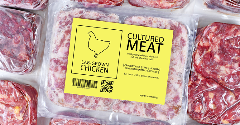News
Protein companies to improve human health though tackling animal disease
30 Apr 2021Cargill, Ausvet, Heifer International and the International Poultry Council (IPC) have formed a consortium sponsored by the United States Agency for International Development (USAID) to improve livestock management and combat the threat of zoonotic diseases to both human and animal health.
In order to investigate how to best combat these diseases, consortium participants will study farming systems in Asia and Africa over the course of five years, using $33 million to enhance global health security and strengthen animal agriculture production. While the association of protein producers will prioritize their study of opportunities to reduce the risk of antimicrobial resistance in animals, they will also focus on reducing the spread of diseases from animals to humans such as foodborne pathogens and anthrax as well as Avian and swine influenza. Primarily, the group will channel their efforts to smallholder farmers in developing countries.

"Smallholder farmers produce the majority of the world's food. By equipping them with tools to improve animal management and biosecurity, we are supporting the production of safe, healthy food that improves nutrition, while preventing the spread of pathogens that threaten global human health," said Pierre Ferrari, President and CEO of Heifer International.
At the same time that smallholder farmers account for the majority of agricultural production worldwide, they are also the most vulnerable to transboundary animal diseases, such as foot-and-mouth disease and African swine fever. Scientists estimate that more than three out of five known infectious diseases in people can be spread from animals, and 75% of new or emerging infectious diseases in people come from animals, according to a press release from Cargill.
Chuck Warta, head of Cargill Health Technologies said the company is “confident that Cargill's global reach and research capabilities, combined with our partners' unique expertise and influence in animal agriculture, can minimize these massive threats to our global food system and to human health."
In addition to minimizing threats to human health through research, Cargill also said that, beginning next year, it plans to conduct nutrition and immune health trials on dairy, poultry, shrimp and swine operations in four countries throughout Asia and Africa to better understand and quantify the role holistic animal nutrition can play in reducing the threats of zoonotic diseases to human health.
Nutrition is not the only component of animal husbandry that interests this consortium. Ausvet will collect real-time data from farms in Indonesia and Vietnam to gain insight into disease occurrence, vaccination programs, and antibiotic usage to encourage data-driven decisions in animal health and its connection to human health. Heifer International will work with smallholder farmers in India and Kenya to improve biosecurity and animal management. IPC will put its efforts toward developing industry-wide policies and standards aimed at decreasing the antimicrobial resistance of animals within the poultry industry.
Foodborne illness and antibiotic resistance are two concerns within the animal protein industry that have been increasing in recent years. Tackling these issues will take a significant amount of research and funding from both public and private sources, but this consortium is an inaugural step into solving these ongoing issues.
Related news

‘Health’ labels on products reduce consumers’ willingness to pay
10 Mar 2025
A study into front-of-packaging “health” labelling finds that these labels alone can lower US consumers’ willingness to pay.
Read more
Food industry lags on healthier product formulation, nutrition index finds
7 Mar 2025
The world’s biggest food manufacturers derive just 34% of their sales from healthier products, according to the 2024 Global Access to Nutrition Index.
Read more
Does calorie labelling lead to reduced consumption?
27 Feb 2025
Calorie labelling of food products leads to a small, but consistent, reduction in the number of calories consumed, a study suggests.
Read more
F&B industry hit with fresh greenwashing claims
26 Feb 2025
The food and beverage (F&B) industry is under fresh scrutiny amid claims of greenwashing, with Arla the latest company in the firing line.
Read more
Have scientists discovered a new tool to measure UPFs?
19 Feb 2025
Researchers have developed a new scoring system and database, compiling over 50,000 food items, of which over 1,000 are classified as ultra-processed.
Read more
Singapore explores farmland-free food production
17 Feb 2025
Researchers discover new technology replicating on-farm food production conditions from within the indoor lab environment.
Read more
Most consumers lack trust in AI, but supplement users are ready to embrace the technology
14 Feb 2025
A survey of UK and US consumers found that most supplement users are willing to let AI make decisions on their behalf, but they also demand greater transparency.
Read more
Indians enjoy first bites of cultivated chicken
13 Feb 2025
The first public tasting of cultivated meat in India has taken place as the country prepares for the first commercial cultivated meat products – potentially as early as the end of this year.
Read more
Disruptor brands spearhead sustainable solutions
11 Feb 2025
Manufacturers, big and small, sharpen their focus by providing sustainable products and services centred on comprehensive and sustainable approaches to traditional methods.
Read more
The future of UPF regulation: Stricter labelling, more taxation, and no more conflicts of interest?
10 Feb 2025
Policymakers are intensifying efforts to regulate ultra-processed foods (UPFs), as mounting evidence links their consumption to increased risks of obesity, cardiovascular disease, and other chronic health issues.
Read more